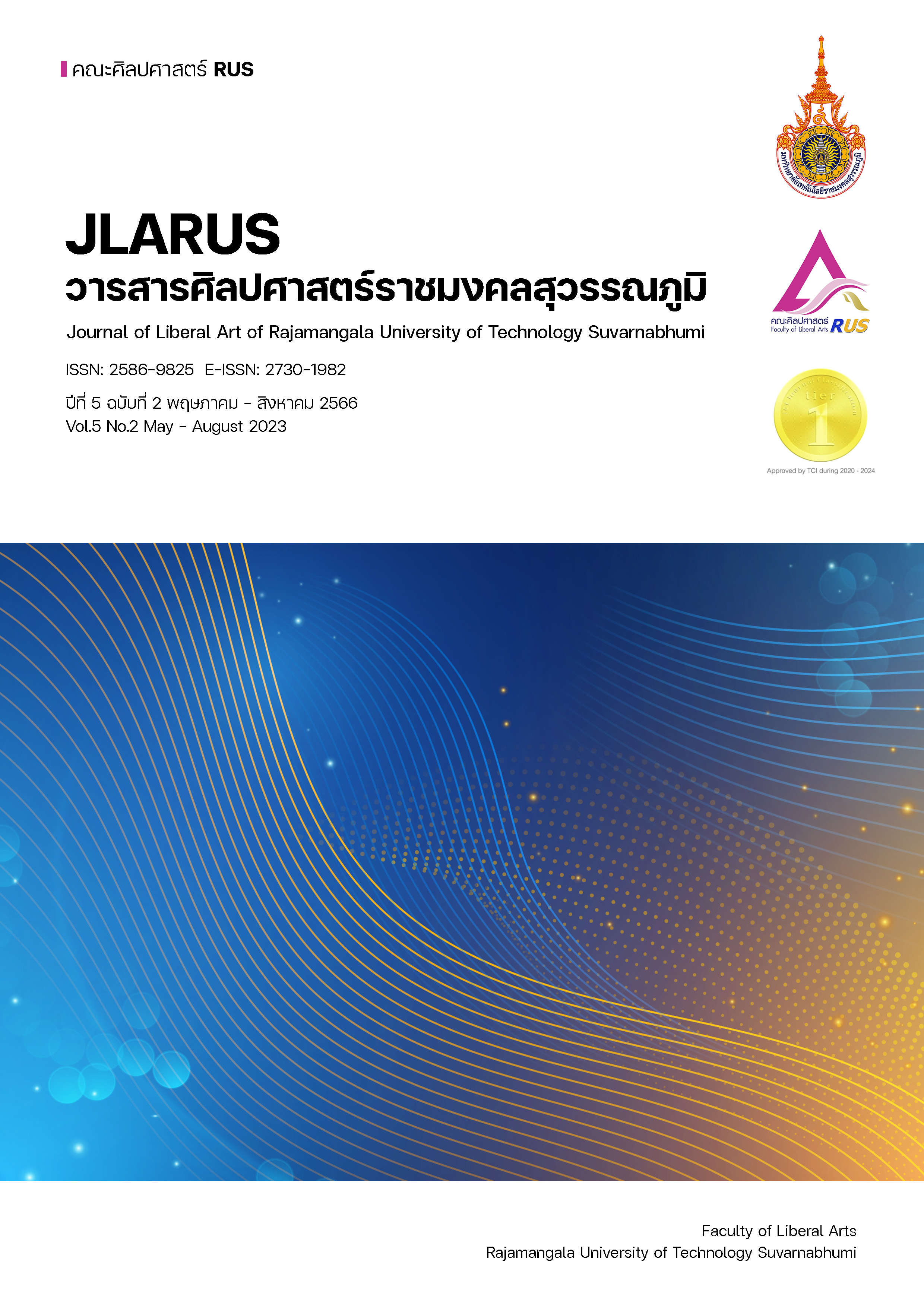BAAMBOOZLE WEBSITE: THE ONLINE TOOL FOR TEACHING AND LEARNING ENGLISH IN COVID-19 POST-PANDEMIC ERA
Main Article Content
Abstract
Education models in COVID-19 post-pandemic era has been modified to a hybrid learning to be diverse in order to ensure that the teaching flows smoothly, whether under epidemic or in normal situations. Applying the model that can be used for teaching and learning in various ways through information technology devices contributes to smooth teaching and learning in the post-COVID-19 era as many education models require those devices to be accessed. Websites or applications are another channel that can be accessed conveniently and quicky using those information technology devices. However, finding an appropriate websites or applications for teaching and learning English is not that easy. Students still faces problems that they are unable to interact and communicate in English, moreover, they are lack of motivation to study. Using an application or website that can solve those problems appropriately is therefore very essential in order for learners to develop their communication skills and help to increase their motivation to study English. The website Baamboozle is a website for teaching and learning English using Game-Based Learning (GBL). It can be applied with the following 4 learning styles: on site, online, on demand and on hand. According to many research, Game-based learning creates a fun learning environment that encourages greater motivation for learners. In addition, the interaction between teachers and learners in class encourages learners to develop their own learning process. It also helps learners to improve their English communication skills because they have to answer the questions that they select in English correctly to get their points.
Article Details

This work is licensed under a Creative Commons Attribution-NonCommercial-NoDerivatives 4.0 International License.
References
กังสดาล ญาณจันทร์. (2564). การคาดการณ์อนาคตนวัตกรรมเพื่อกลยุทธ์การพัฒนาอย่างยั่งยืน: ความไม่เสมอภาคทางการศึกษาในสังคมไทย: การเรียนการสอนออนไลน์. ใน รองอธิการบดีฝ่ายวิจัย และบริการวิชาการ (บ.ก.), การคาดการณ์อนาคตนวัตกรรมเพื่อกลยุทธ์การพัฒนาอย่างยั่งยืน. รายงานสืบเนื่องจากการประชุมวิชาการระดับชาติเนื่องในโอกาสครบรอบปีที่ 55 แห่งการ สถาปนาสถาบันบัณฑิตพัฒนบริหารศาสตร์ ประจำปี 2564 (น. 114-128). สถาบันบัณฑิตพัฒนบริหารศาสตร์.
ณัฏฐา ผิวมา. (2563). การจัดการเรียนรู้โดยใช้เกมเป็นฐานด้วยบูรณาการเทคโนโลยีเกมคอมพิวเตอร์. Journal of Humanities and Social Sciences, Rajapruk University, 7(Special), 1-15.
ธนัญภัสร์ ศรีเนธิยวศิน. (2021). การจัดการเรียนการสอนโดยใช้เกมเป็นฐานที่มีต่อผลสัมฤทธิ์ทางการเรียนของนักศึกษา. วารสารมจรบาฬีศึกษาพุทธโฆสปริทรรศน์, 7(3), 40-55.
ธนาภัสสร์ สนธิรักษ์, รังสรรค์ หล้าคําจา, วิมลพร ระเวงวัลย์, วันวิสาข์ พูลทอง และ เวนุกา ตาลาน(2565). มิติรูปแบบการเรียนการสอนภาษาอังกฤษในยุควิถีชีวิต ใหม่. Journal of MCU Humanities Review, 8(1), 413-432.
ธันนิกานต์ สูญสิ้นภัย. (2563). การทบทวนนโยบายการศึกษาภาษาอังกฤษของไทย. วารสารวิทยาลัย สงฆ์นครลำปาง, 9(1), 86-97.
ปรเมศวร์ รัมยากูร. (2561). การสื่อสารในภาวะวิกฤตของเว็บไซต์และแอปพลิเคชันที่เกี่ยวข้องกับ สถานการณ์โควิด-19 ในประเทศไทย. SIAM COMMUNICATION REVIEW, 19(2), 231-247.
พันธุ์ทิพา หอมทิพย์. (2565). โควิด-๑๙ บนเส้นทางเปลี่ยนผ่านสู่“โรคประจำถิ่น”. วารสารสารวุฒิสภา, 30(1), 19-22.
พิชญาภา ยืนยาว และ ณัฐวรรณ พุ่มดียิ่ง. (2560). รูปแบบการเรียนการสอนแบบบันเทิงของนักศึกษามหาวิทยาราชภัฏนครปฐม. Veridian E-Journal, Silpakorn University (Humanities, Social Sciences and arts), 10(3), 904-920.
ไพสิฐ บริบูรณ์. (2554). การสอนภาษาอังกฤษในประเทศไทย: การปรับเปลี่ยนกระบวนทัศน์จากภาษาอังกฤษในฐานะภาษาต่างประเทศสู่ภาษาอังกฤษในฐานะภาษานานาชาติ. SNRU Journal of Science and Technology, 3(6), 1-12.
วราพร บุญมี. (2564). สื่อการสอนกับการเรียนรู้ในศตวรรษที่ 21. Journal of Legal Entity Management and Local Innovation, 7(9), 373-386.
สำนักงานสถิติแห่งชาติ กระทรวงดิจิทัลเพื่อเศรษฐกิจและสังคม. (2563). สรุปผลที่สำคัญ สำรวจการมีการใช้เทคโนโลยีสารสนเทศและการสื่อสารในครัวเรือน พ.ศ. 2563. สืบค้น 2 เมษายน 2566. จาก http://www.nso.go.th/sites/2014/DocLib13/ด้านICT/เทคโนโลยีในครัวเรือน/2563/Pocketbook63.pdf.
สำนักงานสถิติแห่งชาติ กระทรวงดิจิทัลเพื่อเศรษฐกิจและสังคม. (2565). การสำรวจการมีการใช้เทคโนโลยีสารสนเทศและการสื่อสารในครัวเรือน พ.ศ. 2565 (ไตรมาส 2). สืบค้น 2 เมษายน 2566. จากhttp://www.nso.go.th/sites/2014/DocLib13/ด้านICT/เทคโนโลยีในครัวเรือน/2565/full_report_q2_65.pdf.
เสาวลักษณ์ อนุยันต์. (2020). อนาคตทางการศึกษา: ผลกระทบจากวิกฤติการแพร่ระบาดของไวรัสCOVID-19. วารสารครุศาสตร์มหาวิทยาลัยราชภัฏเลย, 14(2), 14-25.
Baamboozle. (n.d.). Teachers love us. Retrieved April 2, 2023. from https://www.baamboozle.com.
Bada, S. O., & Olusegun, S. (2015). Constructivism learning theory: A paradigm for teaching and learning. Journal of Research & Method in Education, 5(6), 66-70.
Brame, C. (2016). Active learning. Vanderbilt University Center for Teaching.
Columbia University. (2021). Epidemic, Endemic, Pandemic: What are the Differences? Columbia University Irving Medical Center.
Retrieved May 12,2023. from https://www.publichealth.columbia.edu/news/epidemic-endemic-pandemic-what-are-differences.
Hartt, M., Hosseini, H., & Mostafapour, M. (2020). Game on: Exploring the effectiveness of game-based learning. Planning Practice & Research, 35(5), 589-604.
Liu, Z. Y., Shaikh, Z., & Gazizova, F. (2020). Using the concept of game-based learning in education. International Journal of Emerging Technologies in Learning (iJET), 15(14), 53-64.
Locklear, M. (2022). For COVID-19, endemic stage could be two years away. YaleNews. Retrieved May 12,2023. from https://news.yale.edu/2022/07/05/covid-19-endemic-stage-could-be-two-years-away.


